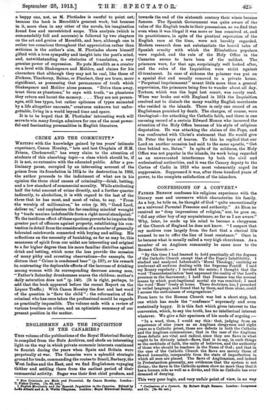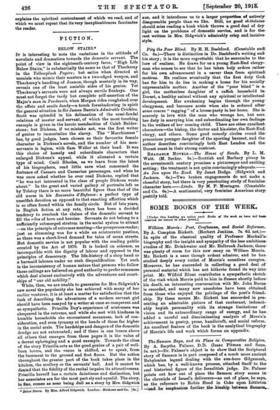CONFESSIONS OF A CONVERT.*
FATHER BENSON confesses his religious experience with the literary ease and unreserve which characterize his family. As a boy, he tells us, he thought of God " quite unemotionally as a universal Parental Presence and authority." At Eton he received no " deep impressions of religion," nor, he goes on, " did any other boy of my acquaintance, so far as I am aware." Why, later, he made up his mind to become a clergyman of the Church of England he does not know. " I suspect that my motives rose largely from the fact that a clerical life• seemed to me to offer the line of least resistance." Once in he became what is usually called a very high churchman. As a
member of an Anglican community he came near to the Roman Church :-
" By this time I had learned to hold practically all the dogmas of the Catholic Church except that of the Pope's Infallibility. I studied and analyzed Lehmkuhl's 'Moral Theology,' omitting as irrelevant all sections dealing with the Supreme Pontiff. I said my Rosary regularly ; I invoked the saints ; I thought that the word 'Transubstantiation' best expressed the reality of Our Lord's presence in the Sacrament ; I held that Penance was the normal means by which post-baptismal mortal sin was remitted; I used the word 'Mass' freely at home. These doctrines, too, I preached in veiled language, and found that by them, and them alone, could I arouse the enthusiasm of congregations."
From here to the Roman Church was but a short step, but one which has made the " confessor " supremely and even ecstatically happy. It is this fact which gives interest to the conversion, which, to say the truth, has no intellectual interest whatever. We give a fair specimen of his mode of arguing :—
" In a word, then, I would say this : that, judging from an experience of nine years as an Anglican clergyman and eight years as a Catholic priest, there are defects in both the Catholic and the Anglican communions; in the case of the Anglican these detects are vital and raical, since they are flaws in what ought to be divinely intact—flaws, that is to say, in such things as the certitude of faith, the unity of believers, and the authority of those who should be teachers in the Name of God ; and that in the case of the Catholic Church the flaws are merely those of flawed humanity, inseparable from the state of imperfection in which all men are placed. The flaws of Anglicanism, and indeed in Protestantism generally, are evidences that the system is not divine ; the Saws in the Catholic system show no more than that it has a human side as well as a divine, and this no Catholic has ever dreamed of denying.
This very poor logic, and very unfair point of view, in no way
explains the spiritual contentment of which we read, and of which we must repeat that its very inexplicableness fascinates the reader,











































 Previous page
Previous page